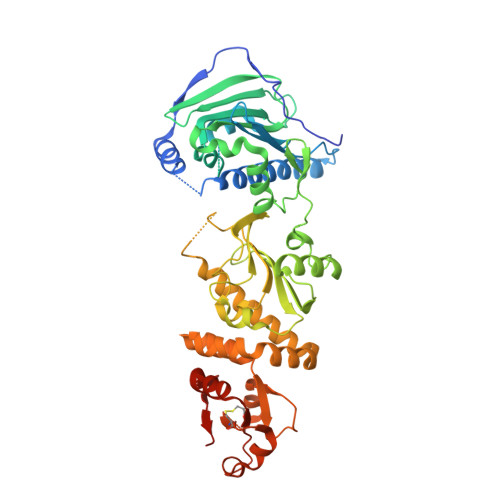Pan-HSP90 ligand binding reveals isoform-specific differences in plasticity and water networks.
Stachowski, T.R., Nithianantham, S., Vanarotti, M., Lopez, K., Fischer, M.(2023) Protein Sci 32: e4629-e4629
- PubMed: 36938943
- DOI: https://doi.org/10.1002/pro.4629
- Primary Citation of Related Structures:
7ULJ, 7ULK, 7ULL - PubMed Abstract:
Isoforms of heat shock protein 90 (HSP90) fold oncoproteins that facilitate all 10 hallmarks of cancer. However, its promise as a therapeutic target remains unfulfilled as there is still no FDA-approved drug targeting HSP90 in disease. Among the reasons hindering progress are side effects caused by pan-HSP90 inhibition. Selective targeting of the four isoforms is challenging due to high sequence and structural similarity. Surprisingly, while decades of drug discovery efforts have produced almost 400 human HSP90 structures, no single ligand has been structurally characterized across all four human isoforms to date, which could reveal structural differences to achieve selectivity. To better understand the HSP90 landscape relevant for ligand binding and design we take a three-pronged approach. First, we solved the first complete set of structures of a single ligand bound to all four human isoforms. This enabled a systematic comparison of how side-chains and water networks respond to ligand binding across isoforms. Second, we expanded our analysis to publicly available, incomplete isoform-ligand series with distinct ligand chemistry. This highlighted general trends of protein and water mobility that differ among isoforms and impact ligand binding. Third, we further probed the Hsp90α conformational landscape for accommodating a congeneric series containing the purine scaffold common to HSP90 inhibitors. This revealed how minor ligand modifications flip ligand poses and perturb water and protein conformations. Taken together, this work illustrates how a systematic approach can shed new light on an "old" target and reveal hidden isoform-specific accommodations of congeneric ligands that may be exploited in ligand discovery and design.
- Department of Chemical Biology and Therapeutics, St. Jude Children's Research Hospital, Memphis, Tennessee, USA.
Organizational Affiliation:


















